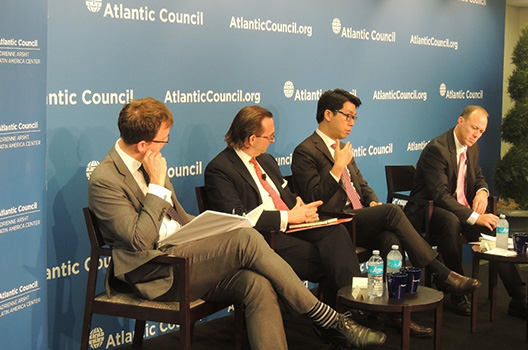 On October 4, the Atlantic Council’s Adrienne Arsht Latin America Center convened financial experts from the US, Latin America, and China to discuss the next phrase of the China-Latin America relationship and the launch of the Atlantic Council’s most recent publication on this topic, “A Globalized Renminbi: will it reshape Latin America?”.
On October 4, the Atlantic Council’s Adrienne Arsht Latin America Center convened financial experts from the US, Latin America, and China to discuss the next phrase of the China-Latin America relationship and the launch of the Atlantic Council’s most recent publication on this topic, “A Globalized Renminbi: will it reshape Latin America?”.
Three days before the launch, the Chinese renminbi (RMB) joined the dollar, the euro, the yen, and the pound as the fifth currency included in the International Monetary Fund’s Special Drawing Rights (SDR). The China–Latin America relationship has already proven to be highly complex, and RMB internationalization presents unique opportunities and challenges for Latin America and the US.
Jon Huntsman, former US Ambassador to China and Chairman of the Atlantic Council, introduced Gerardo Mato, Chairman of Global Banking of the Americas at HSBC, and provided opening remarks on the timeliness of the report and global significance of China’s inclusion in the SDR.
The first panel, “RMB on the Global Stage: What to Expect?” was moderated by Sam Fleming, US Economics Editor of the Financial Times, and featured Douglas Arner, Professor of Law at the University of Hong Kong and coauthor of the report, Heiwai Tang, Assistant Professor of International Economics at the Johns Hopkins School of Advanced International Studies, and Clyde Wardle, Emerging Markets Foreign Exchange Strategist at HSBC. Fleming opened the conversation with questions on the broader ramifications of internationalization and how RMB policy has worked so far.
Arner explained that RMB internationalization—symbolic of Beijing’s reemergence as one of the world’s major economies— animates concerns about how increasing use of the renminbi will alter existing currency dynamics and impact global markets.
“As we look at China’s increasing economic role in the world it is important to think about the relationships between the major currencies, like the dollar and the euro, and particularly as the RMB emerges to look at the sort of challenges for global markets,” stated Arner. Additionally, he noted the currency and financial market volatility, which has characterized China’s domestic markets in the past, as a challenge accompanying greater international reliance on the renminbi.
The conversation transitioned to what the internationalization process will mean for China’s economy. Recognition of the renminbi as a major international currency has long been a priority for China as a way to play a more active role in global economic affairs. While SDR inclusion adds credibility to the currency, skepticism persists about the high degree of government involvement and legitimacy of the exchange rate.
“Hopefully the renminbi being included as an SDR currency of the IMF will provide some legitimacy and also some external pressure so that on the one hand their hands are tied so that they cannot intervene whenever they want, and on the other hand it allows the government to provide confidence and credibility to their financial system,” stated Tang.
“Already we are beginning to see major central banks around the world, including Latin America, buying renminbi for their reserve assets, and I think we will continue to see that trend,” commented Wardle.
The panelists emphasized the many barriers in the Chinese market for investors, banks, and producers and agreed that the RMB is far from rivaling the dollar regarding international currency presence.
During the second panel, “Will the RMB reshape Latin America?” Jason Marczak, Director of the Latin America Economic Growth Initiative at the Atlantic Council addressed the questions essential to Latin American countries and business leaders: How will the globalized RMB create new investment opportunities? What are the risks of an increase in RMB use and Chinese investments in Latin America? How will China’s influence in Latin America impact the US economic presence in the region?
The panel featured Ambassador Luis Miguel Castilla, Senior Fellow at the Adrienne Arsht Latin America Center and Former Finance Minister of Peru, Barbara Kotschwar, Senior Investment Policy Officer at the World Bank; and Claudia Trevisan, Washington correspondent and former Beijing correspondent for O Estado de São Paulo.
While the impact of RMB internationalization remains unclear, Kotschwar hopes it will help improve the massive trade imbalance between China and Latin America.
“Latin America imports lots of Chinese goods but has not been able to break into the Chinese market in terms of exports or investment,” Kotschwar said. “If internationalization of the currency and the ability to use the renminbi can expand that and Latin American companies can gain greater access to the Chinese market then this would help Latin America break into a dynamic market.”
Castilla reinforced the perspective of the first panel that the potential of the RMB to become an asset for the region depends on further domestic reforms in China. The experts concluded the panel with comments on the examples of Venezuela, Argentina, and Brazil and the importance of TPP and the path forward for the US—Latin America relationship.
Image: From left to right, US Economics Editor of the Financial Times Sam Fleming, Professor of Law at the University of Hong Kong Douglas Arner, Assistant Professor of International Economics at the Johns Hopkins School of Advanced International Studies Heiwai Tang, and Emerging Markets Foreign Exchange strategist at HSBC Clyde Wardle. (Atlantic Council / Juan Felipe Celia).
